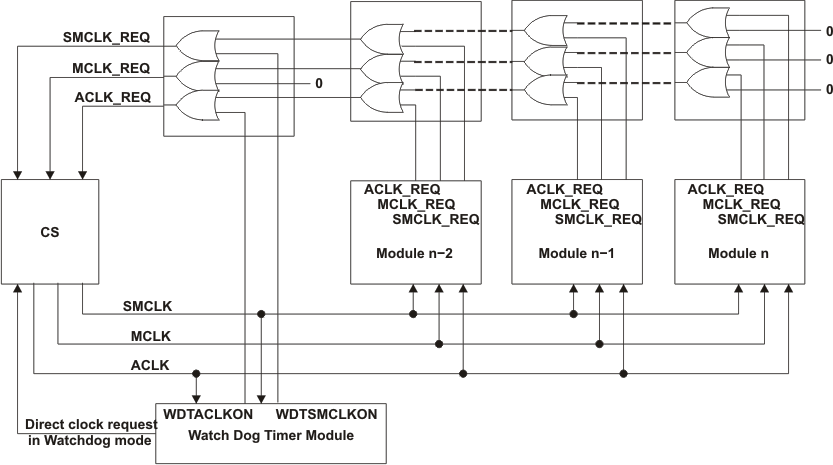SLAU367P October 2012 – April 2020 MSP430FR5041 , MSP430FR5043 , MSP430FR50431 , MSP430FR5847 , MSP430FR58471 , MSP430FR5848 , MSP430FR5849 , MSP430FR5857 , MSP430FR5858 , MSP430FR5859 , MSP430FR5867 , MSP430FR58671 , MSP430FR5868 , MSP430FR5869 , MSP430FR5870 , MSP430FR5872 , MSP430FR58721 , MSP430FR5887 , MSP430FR5888 , MSP430FR5889 , MSP430FR58891 , MSP430FR5922 , MSP430FR59221 , MSP430FR5947 , MSP430FR59471 , MSP430FR5948 , MSP430FR5949 , MSP430FR5957 , MSP430FR5958 , MSP430FR5959 , MSP430FR5962 , MSP430FR5964 , MSP430FR5967 , MSP430FR5968 , MSP430FR5969 , MSP430FR5969-SP , MSP430FR59691 , MSP430FR5970 , MSP430FR5972 , MSP430FR59721 , MSP430FR5986 , MSP430FR5987 , MSP430FR5988 , MSP430FR5989 , MSP430FR5989-EP , MSP430FR59891 , MSP430FR5992 , MSP430FR5994 , MSP430FR59941 , MSP430FR6005 , MSP430FR6007 , MSP430FR6035 , MSP430FR6037 , MSP430FR60371 , MSP430FR6041 , MSP430FR6043 , MSP430FR60431 , MSP430FR6045 , MSP430FR6047 , MSP430FR60471 , MSP430FR6820 , MSP430FR6822 , MSP430FR68221 , MSP430FR6870 , MSP430FR6872 , MSP430FR68721 , MSP430FR6877 , MSP430FR6879 , MSP430FR68791 , MSP430FR6887 , MSP430FR6888 , MSP430FR6889 , MSP430FR68891 , MSP430FR6920 , MSP430FR6922 , MSP430FR69221 , MSP430FR6927 , MSP430FR69271 , MSP430FR6928 , MSP430FR6970 , MSP430FR6972 , MSP430FR69721 , MSP430FR6977 , MSP430FR6979 , MSP430FR69791 , MSP430FR6987 , MSP430FR6988 , MSP430FR6989 , MSP430FR69891
3.2.7 Operation From Low-Power Modes, Requested by Peripheral Modules
A peripheral module requests its clock sources automatically from the CS module if required for its proper operation, regardless of the current power mode of operation, as shown in Figure 3-2.
 Figure 3-2 Module Request Clock System
Figure 3-2 Module Request Clock System A peripheral module asserts one of three possible clock request signals based on its control bits: ACLK_REQ, MCLK_REQ, or SMCLK_REQ. These request signals are based on the configuration and clock selection of the respective module. For example, if a timer selects ACLK as its clock source and the timer is enabled, the timer generates an ACLK_REQ signal to the CS system. The CS, in turn, enables ACLK regardless of the power mode settings.
Any clock request from a peripheral module causes its respective clock off signal to be overridden, but does not change the setting of the clock off control bit. For example, a peripheral module may require ACLK that is currently disabled by the OSCOFF bit (OSCOFF = 1). The module can request ACLK by generating an ACLK_REQ. This causes the OSCOFF bit to have no effect, thereby allowing ACLK to be available to the requesting peripheral module. The OSCOFF bit remains at its current setting (OSCOFF = 1).
If the requested source is not active, the software NMI handler must take care of the required actions. For the previous example, if ACLK was sourced by LFXT and LFXT was not enabled, an oscillator fault condition occurs, and the software must handle the event. The watchdog, due to its security requirement, actively selects the LFMODCLK source if the originally selected clock source is not available.
Due to the clock request feature, care must be taken in the application when entering low-power modes to save power. Although the device enters the selected low-power mode, a clock request causes more current consumption than the specified values in the data sheet. By default, the clock request feature is enabled. The feature can be disabled for each system clock by clearing ACLKREQEN, MCLKREQEN, or SMCLKREQEN for the respective clocks. This does not disable fail-safe clock requests; for example, those of the watchdog timer or the clock system itself.
The function of the ACLKREQEN, MCLKREQEN, and SMCLKREQEN bits are dependent upon which power mode is selected; that is, they do not have an effect across all power modes. For example, ACLKREQEN is used to enable or disable ACLK requests. It is effective only in LPM4, because ACLK is always active in all other modes (AM, LPM0, LPM1, LPM2, LPM3). SMCLKREQEN is used to enable or disable SMCLK requests. When SMCLKOFF = 0 and in AM, LPM0, or LPM1, it is a don't care, because SMCLK is always on in these cases. For SMCLKOFF = 0 and in LPM2, LPM3, and LPM4, SMCLKREQEN can be used to enable or disable SMCLK requests, because SMCLK is normally off in these modes. When SMCLKOFF = 1, SMCLKREQEN can be used to enable or disable SMCLK requests, because SMCLK is normally off in all power modes under this condition. This is summarized in Table 3-2.
Table 3-2 System Clocks, Power Modes, and Clock Requests
| Mode | System Clocks | |||||||
|---|---|---|---|---|---|---|---|---|
| MCLK | ACLK | SMCLK | ||||||
| SMCLKOFF = 0 | SMCLKOFF = 1 | |||||||
| MCLKREQEN = 0 and Clock Requested | MCLKREQEN = 1 and Clock Requested | ACLKREQEN = 0 and Clock Requested | ACLKREQEN = 1 and Clock Requested | SMCLKREQEN = 0 and Clock Requested | SMCLKREQEN = 1 and Clock Requested | SMCLKREQEN = 0 and Clock Requested | SMCLKREQEN = 1 and Clock Requested | |
| AM | Active | Active | Active | Active | Active | Active | Disabled | Active |
| LPM0 | Disabled | Active | Active | Active | Active | Active | Disabled | Active |
| LPM1 | Disabled | Active | Active | Active | Active | Active | Disabled | Active |
| LPM2 | Disabled | Active | Active | Active | Disabled | Active | Disabled | Active |
| LPM3 | Disabled | Active | Active | Active | Disabled | Active | Disabled | Active |
| LPM4 | Disabled | Active | Disabled | Active | Disabled | Active | Disabled | Active |
| LPM3.5 | Disabled | Disabled | Disabled(1) | Disabled | Disabled | Disabled | Disabled | Disabled |
| LPM4.5 | Disabled | Disabled | Disabled | Disabled | Disabled | Disabled | Disabled | Disabled |